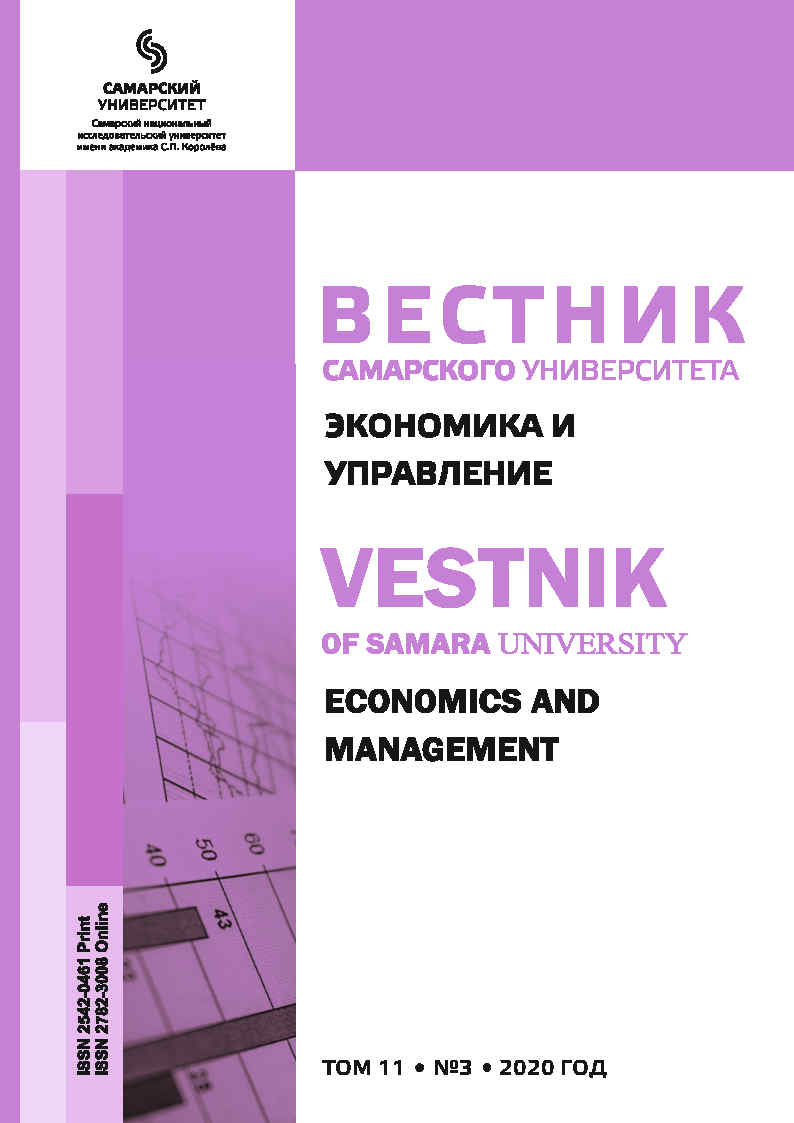STUDY OF THE ORGANIZATIONAL CULTURE OF THE CUSTOMS AUTHORITIES OF THE REGION (BASED ON MATERIALS FROM THE SAMARA CUSTOMS)
- Authors: Gorbunova Y.N.1, Trubitsyn K.V.1, Solovova N.V.2, Kalmykova O.Y.1
-
Affiliations:
- Samara State Technical University
- Samara National Research University
- Issue: Vol 11, No 3 (2020)
- Pages: 139-155
- Section: HUMANE RESOURCES MANAGEMENT
- URL: https://journals.ssau.ru/eco/article/view/8146
- DOI: https://doi.org/10.18287/2542-0461-2020-11-3-139-155
- ID: 8146
Cite item
Full Text
Abstract
The organizational culture of customs authorities is understood by the authors as a set of norms, rules, customs and traditions that are supported by customs authorities and set a general framework for the behavior
of officials. To determine the key characteristics and analyze the dynamics of the organizational culture of the customs authorities, the methodology of Robert E. Quinn and Kim S. Cameron Organizational Culture Assessment Instrument (OCAI) was used. This methodology is based on the framework construction
of competing values corresponding to four types of culture: clan, adhocratic, market, bureaucratic. According to the results of the survey, currently the bureaucratic type of organizational culture prevails in the Samara customs, the values of the other types of cultures are approximately equal to each other. At the same time, there are significant differences between the prevailing and preferred type of organizational culture. In the preferred state, the adhocratic type of culture predominates, bureaucracy is in second place in importance, then the clan and the market type of culture. At the second stage of the study, using the method of analyzing hierarchies, an expert assessment of the formation of the preferred – adhocratic type of organizational culture of customs authorities was carried out. The factor analysis of the identified types of organizational cultures of the customs authority made it possible to determine which type of organizational culture contains the potential for increasing the effectiveness of personnel management. To solve this problem, a mathematical tool was used – the method of analyzing hierarchies. The data obtained as a result of the application of the OCAI methodology and the hierarchy analysis method in the study of organizational culture made it possible to solve the problems of defining the type and strength of the culture dominant in the customs authorities, to establish profiles for the existing and intended organizational culture and to determine the scenario for further changes in the organizational culture of the customs authorities. contributing to improving the efficiency of personnel management.
Keywords
About the authors
Yulia N. Gorbunova
Samara State Technical University
Author for correspondence.
Email: 080505@mail.ru
сandidate of Economic Sciences, assistant professor of the Department of Management and System Analysis of Socio-Technical and Thermal Power Complexes
Russian FederationKonstantin V. Trubitsyn
Samara State Technical University
Email: tef-samgtu@yandex.ru
assistant professor of the Department of Management and System Analysis of Socio-Technical and Thermal Power Complexes
Russian FederationNatalia V. Solovova
Samara National Research University
Email: solovova.nata@mail.ru
doctor of Pedagogical Sciences, associate professor, head of the Department of Human Resources Management
Russian FederationOlga Yu. Kalmykova
Samara State Technical University
Email: oukalmiykova@mail.ru
candidate of Pedagogical Sciences, assisstant professor of the Department
of Management and System Analysis of Sociotechnical and Thermal Complexes
References
- Order of the Government of the Russian Federation dated 23.05.2020 № 1388-r «Strategy for the development of the customs service of the Russian Federation until 2030». Available at: http://www.consultant.ru/document/cons_doc_LAW_353557 (accessed 17.05.2020). (In Russ.)
- Vikhanskiy O.S., Naumov A.I. Management: textbook. Moscow: Magistr: INFRA-M, 2014, 576 p. (In Russ.)
- Kim Cameron S., Pobert Quinn R. Diagnosing and Changing Organizational Culture Based on the Competing Values Framework. Saint Petersburg: Piter, 2001, 311 p. Available at: http://ludmila-petrashko.com.ua/assets/files/kurs/Traning-CMP/Literatura/kameron_kuin_ok.pdf. (In Russ.)
- Magura M.I., Kurbatova M.B. Modern personnel-technologies. Moscow: ZAO «Biznes-shkola – Intel-Sintez», 2013, 388 p. (In Russ)
- Solomanidina T.O., Volgina O.N. Organizational culture in tables, tests, cases and schemes. Moscow: Infra-M, 2007, 393 p. (In Russ.)
- Semenov Yu.G. Organizational culture: textbook. Moscow: Logos, 2013, 370 p. (In Russ.)
- Shein E.H. Organizational culture and leadership. Saint Petersburg, 2002, part 2, 336 p. (In Russ.)
- Spivak V.A. Corporate culture: theory and practice: textbook. Moscow: Piter, 2013, 243 p. (In Russ.)
- Demidova E.V. Organizational culture and its impact on the organizational effectiveness.. Available at: https://www.science-education.ru/pdf/2014/5/660.pdf. (accessed 20.05.2020). (In Russ.)
- Nepomniashchii A.V. Organizational culture as a factor of increasing effectiveness of activity of an organization: Candidate's of Economical Sciences thesis: 08.00.05. Moscow: RGB, 2011, 229 p. Available at: https://www.dissercat.com/content/organizatsionnaya-kultura-kak-faktor-povysheniya-effektivnosti-deyatelnosti-organizatsii. (In Russ.)
- Tomilov V.V. Culture of entrepreneurship. Saint Petersburg: Piter, 2000, 368 p. (In Russ.)
- Information on the current activities of the customs authority. Available at: http://ptu.customs.gov.ru/folder/126052 (accessed 17.05.2020). (In Russ.)
- Dudina V.I., Smirnova E.E. (Eds.) Methodology and methods of sociological study: textbook. Saint-Petersburg: Izdatel'stvo Sankt-Peterburgskogo gosudarstvennogo universiteta, 2014, 388 p. (In Russ.)
- Tsapenko M.V. Applied programming: Laboratory Operations Manual. Samara, 2016, 28 p. (In Russ.)
- Estimate of economic magnitudes and enterprise management. Methods of analysis of hierarchies. Available at: http://www.vamocenka.ru (accessed 23.05.2020). (In Russ.)
Supplementary files









